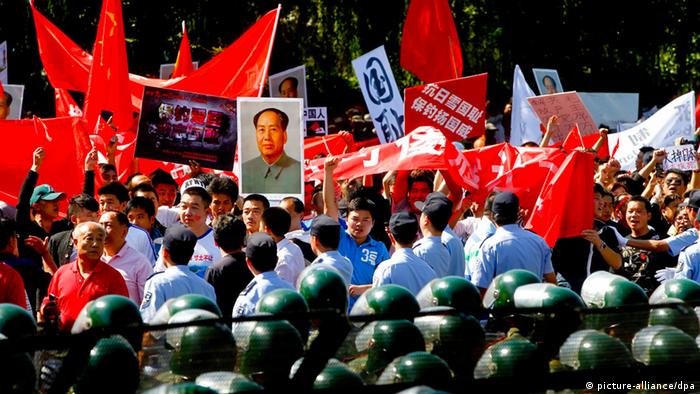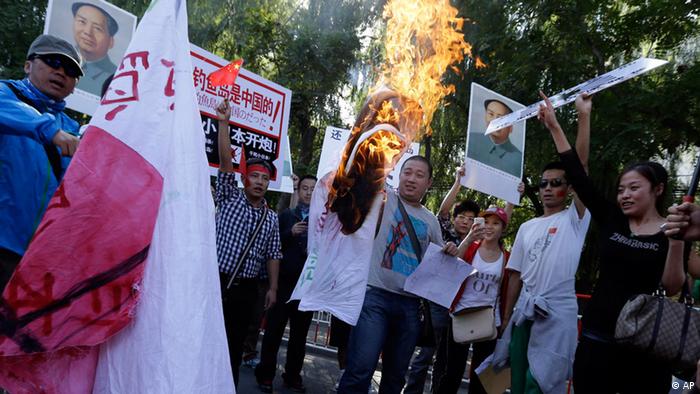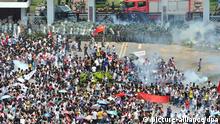East Asian rivalry
Protesting too much
Anti-Japanese demonstrations run the risk of going off-script
Sep 22nd 2012 | BEIJING
| from the print edition
-
 Anti-Japan protesters shout slogans as they march outside the Japanese embassy in BeijingAP
Anti-Japan protesters shout slogans as they march outside the Japanese embassy in BeijingAP -
 Protesters laugh and snap photos next to a burning Japanese flag during demonstrations in Wuhan, in Hubei provinceREUTERS
Protesters laugh and snap photos next to a burning Japanese flag during demonstrations in Wuhan, in Hubei provinceREUTERS
1 / 13
CHINESE authorities have plenty of experience stage-managing nationalistic displays and then suddenly shutting them down. But the latest dispute with Japan—and the ensuing protests in China—has raised tensions to their highest level in years. Japan’s agreement to buy some rocky islands, claimed by both countries, from their private Japanese owner prompted sometimes violent demonstrations in dozens of Chinese cities. On September 14th six unarmed Chinese patrol boats navigated briefly into Japanese-administered waters around the disputed rocks, which Japan calls the Senkaku islands and China calls the Diaoyus.
Into this melodrama stepped the American defence secretary, Leon Panetta. He stopped in both countries, urged both sides to get along better and affirmed America’s pledge of mutual defence with Japan—though an unnamed senior American military official stage-whispered to the Washington Post that America wouldn’t go to war “over a rock”.
China, however, has chosen to take the matter of the islands rather more seriously. Xinhua, an official news service, reported that Xi Jinping, China’s vice-president and heir apparent, in his meeting with Mr Panetta on September 19th, called Japan’s planned purchase of the islands a “farce”, urging that Japan “rein in its behaviour”. This kind of rhetoric has become worryingly familiar. China’s actions call to mind similar claims to islands in the South China Sea. (America is officially neutral on claims to all the disputed territory.)

If so, they got their desire. The protests across China climaxed on September 18th, the anniversary of the 1931 “Mukden Incident” that became a pretext for the Japanese invasion of China. Many Japanese factories and businesses shut for the day, and Japanese nationals were advised to keep a low profile. In Beijing hundreds of Chinese protesters hurled plastic bottles and officially approved abuse at the Japanese embassy. About 50 Chinese protesters inflicted minor damage on the car of America’s ambassador, Gary Locke.
Keeping the lid on
Then the protests were reined in. While some Chinese boats continued sailing near the islands, Chinese cities returned to normal on September 19th, as suddenly as they had in the largest previous round of anti-Japanese protests in 2005. But holding the Chinese public to a single script is proving more difficult than ever, especially now that citizens (and foreigners—see next page) can write an alternative storyline on Twitter-like microblogs. Some posted their feelings of embarrassment at the thuggish behaviour by some of their countrymen (Japanese cars were a popular target for destruction, and on September 15th a Toyota dealership and Panasonic plant in Qingdao, a port city once occupied by Japan, were reported damaged by fire). Others described efforts by authorities to co-ordinate the demonstrations. A journalist for Caixin, a financial magazine, reported a policeman’s invitation to her to join in a demonstration. When she asked if she could shout anti-corruption slogans as well, he told her to stick to the approved anti-Japanese ones.
Anger at Japan is real and enduring in China. Years of Chinese propaganda and patriotic education have deepened the wounds of Japanese wartime depredations. But Chinese citizens also have many other domestic complaints—corruption, pollution, land grabs by officials—that lead to scattered protests around the country every day. Hence, in the short run, stoking anti-Japanese anger can seem a tempting choice for the authorities. Wenfang Tang and Benjamin Darr, two American scholars, concluded in a paper published this month and based on surveys conducted in the past decade, that “nationalism serves as a powerful instrument in impeding public demand for democratic change”. The study also found that China had the highest level of nationalism of 36 countries and regions surveyed. America and Japan were not far behind.
http://www.economist.com/node/21563316
China and Japan
Could Asia really go to war over these?
The bickering over islands is a serious threat to the region’s peace and prosperity
Sep 22nd 2012 | from the print edition

That, thank goodness, is grotesque hyperbole: the government in Beijing is belatedly trying to play down the dispute, aware of the economic interests in keeping the peace. Which all sounds very rational, until you consider history—especially the parallel between China’s rise and that of imperial Germany over a century ago. Back then nobody in Europe had an economic interest in conflict; but Germany felt that the world was too slow to accommodate its growing power, and crude, irrational passions like nationalism took hold. China is re-emerging after what it sees as 150 years of humiliation, surrounded by anxious neighbours, many of them allied to America. In that context, disputes about clumps of rock could become as significant as the assassination of an archduke.
One mountain, two tigers
Optimists point out that the latest scuffle is mainly a piece of political theatre—the product of elections in Japan and a leadership transition in China. The Senkakus row has boiled over now because the Japanese government is buying some of the islands from a private Japanese owner. The aim was to keep them out of the mischievous hands of Tokyo’s China-bashing governor, who wanted to buy them himself. China, though, was affronted. It strengthened its own claim and repeatedly sent patrol boats to encroach on Japanese waters. That bolstered the leadership’s image, just before Xi Jinping takes over.
More generally, argue the optimists, Asia is too busy making money to have time for making war. China is now Japan’s biggest trading partner. Chinese tourists flock to Tokyo to snap up bags and designer dresses on display in the shop windows on Omotesando. China is not interested in territorial expansion. Anyway, the Chinese government has enough problems at home: why would it look for trouble abroad?
Asia does indeed have reasons to keep relations good, and this latest squabble will probably die down, just as others have in the past. But each time an island row flares up, attitudes harden and trust erodes. Two years ago, when Japan arrested the skipper of a Chinese fishing boat for ramming a vessel just off the islands, it detected retaliation when China blocked the sale of rare earths essential to Japanese industry.
The islands matter, therefore, less because of fishing, oil or gas
than as counters in the high-stakes game for Asia’s future. Every
incident, however small, risks setting a precedent. Japan, Vietnam and
the Philippines fear that if they make concessions, China will sense
weakness and prepare the next demand. China fears that if it fails to
press its case, America and others will conclude that they are free to
scheme against it.
Co-operation and deterrence
Asia’s inability to deal with the islands raises doubts about how it would cope with a genuine crisis, on the Korean peninsula, say, or across the Strait of Taiwan. China’s growing taste for throwing its weight around feeds deep-seated insecurities about the way it will behave as a dominant power. And the tendency for the slightest tiff to escalate into a full-blown row presents problems for America, which both aims to reassure China that it welcomes its rise, and also uses the threat of military force to guarantee that the Pacific is worthy of the name.
Some of the solutions will take a generation. Asian politicians have to start defanging the nationalist serpents they have nursed; honest textbooks would help a lot. For decades to come, China’s rise will be the main focus of American foreign policy. Barack Obama’s “pivot” towards Asia is a useful start in showing America’s commitment to its allies. But China needs reassuring that, rather than seeking to contain it as Britain did 19th-century Germany, America wants a responsible China to realise its potential as a world power. A crudely political WTO complaint will add to Chinese worries (see article).
Given the tensions over the islands (and Asia’s irreconcilable versions of history), three immediate safeguards are needed. One is to limit the scope for mishaps to escalate into crises. A collision at sea would be less awkward if a code of conduct set out how vessels should behave and what to do after an accident. Governments would find it easier to work together in emergencies if they routinely worked together in regional bodies. Yet, Asia’s many talking shops lack clout because no country has been ready to cede authority to them.
A second safeguard is to rediscover ways to shelve disputes over sovereignty, without prejudice. The incoming President Xi should look at the success of his predecessor, Hu Jintao, who put the “Taiwan issue” to one side. With the Senkakus (which Taiwan also claims), both Mao Zedong and Deng Xiaoping were happy to leave sovereignty to a later generation to decide. That makes even more sense if the islands’ resources are worth something: even state-owned companies would hesitate to put their oil platforms at risk of a military strike. Once sovereignty claims have been shelved, countries can start to share out the resources—or better still, declare the islands and their waters a marine nature reserve.
But not everything can be solved by co-operation, and so the third safeguard is to bolster deterrence. With the Senkakus, America has been unambiguous: although it takes no position on sovereignty, they are administered by Japan and hence fall under its protection. This has enhanced stability, because America will use its diplomatic prestige to stop the dispute escalating and China knows it cannot invade. Mr Obama’s commitment to other Asian islands, however, is unclear.
The role of China is even more central. Its leaders insist that its growing power represents no threat to its neighbours. They also claim to understand history. A century ago in Europe, years of peace and globalisation tempted leaders into thinking that they could afford to play with nationalist fires without the risk of conflagration. After this summer, Mr Xi and his neighbours need to grasp how much damage the islands are in fact causing. Asia needs to escape from a descent into corrosive mistrust. What better way for China to show that it is sincere about its peaceful rise than to take the lead?
Co-operation and deterrence
Asia’s inability to deal with the islands raises doubts about how it would cope with a genuine crisis, on the Korean peninsula, say, or across the Strait of Taiwan. China’s growing taste for throwing its weight around feeds deep-seated insecurities about the way it will behave as a dominant power. And the tendency for the slightest tiff to escalate into a full-blown row presents problems for America, which both aims to reassure China that it welcomes its rise, and also uses the threat of military force to guarantee that the Pacific is worthy of the name.
Some of the solutions will take a generation. Asian politicians have to start defanging the nationalist serpents they have nursed; honest textbooks would help a lot. For decades to come, China’s rise will be the main focus of American foreign policy. Barack Obama’s “pivot” towards Asia is a useful start in showing America’s commitment to its allies. But China needs reassuring that, rather than seeking to contain it as Britain did 19th-century Germany, America wants a responsible China to realise its potential as a world power. A crudely political WTO complaint will add to Chinese worries (see article).
Given the tensions over the islands (and Asia’s irreconcilable versions of history), three immediate safeguards are needed. One is to limit the scope for mishaps to escalate into crises. A collision at sea would be less awkward if a code of conduct set out how vessels should behave and what to do after an accident. Governments would find it easier to work together in emergencies if they routinely worked together in regional bodies. Yet, Asia’s many talking shops lack clout because no country has been ready to cede authority to them.
A second safeguard is to rediscover ways to shelve disputes over sovereignty, without prejudice. The incoming President Xi should look at the success of his predecessor, Hu Jintao, who put the “Taiwan issue” to one side. With the Senkakus (which Taiwan also claims), both Mao Zedong and Deng Xiaoping were happy to leave sovereignty to a later generation to decide. That makes even more sense if the islands’ resources are worth something: even state-owned companies would hesitate to put their oil platforms at risk of a military strike. Once sovereignty claims have been shelved, countries can start to share out the resources—or better still, declare the islands and their waters a marine nature reserve.
But not everything can be solved by co-operation, and so the third safeguard is to bolster deterrence. With the Senkakus, America has been unambiguous: although it takes no position on sovereignty, they are administered by Japan and hence fall under its protection. This has enhanced stability, because America will use its diplomatic prestige to stop the dispute escalating and China knows it cannot invade. Mr Obama’s commitment to other Asian islands, however, is unclear.
The role of China is even more central. Its leaders insist that its growing power represents no threat to its neighbours. They also claim to understand history. A century ago in Europe, years of peace and globalisation tempted leaders into thinking that they could afford to play with nationalist fires without the risk of conflagration. After this summer, Mr Xi and his neighbours need to grasp how much damage the islands are in fact causing. Asia needs to escape from a descent into corrosive mistrust. What better way for China to show that it is sincere about its peaceful rise than to take the lead?
*****在線報導 / 新聞報導epa03401270 Chinese demonstrators protest outside the Japanese embassy in Beijing, China, 18 September 2012. Tensions between China and Japan keep escalating following Japan's purchase of the Diaoyu or Senkaku islands. The date 18 September marks the anniversary of Japan's invasion of China's northern territories. EPA /DIEGO AZUBEL新聞報導中國知識分子看反日中國民眾的反日情緒被權力操弄時,知識分子扮演了什麼樣的角色,產生了什麼樣的影響?(德國之聲中文網)一隊從河北固安縣來到北京的遊行隊伍正在喊口號:"毛主席萬歲!"一位老人上前表達反對意見,一個中年人呵斥他說:"你罵主席,你就是個漢奸!你就是日本人的內應!" 老人不理睬,中年人便出打了他兩個耳光。這個中年人是北京航空航天大學教授。他於次日發表聲明說,不但不後悔,以後遇到類似情況還要打人。他的言行在網絡上得到很多支持,但來自知識分子的回應大多是批評、譴責和鄙視。在近日發生的反日遊行及其引發的打砸搶騷亂中,知識分子扮演了什麼樣的角色?大多關注公共事件的知識分子都通過文章、微博和網絡論壇發表意見。權力交替時的民意操弄中國社會科學院農村發展研究所研究員於建嶸在新浪微博上說,"中國許多城市發生了嚴重的社會騷亂。1、這是底層民眾對社會強烈不滿情緒的極端宣洩;2、釣魚島事件使這類宣洩披上了愛國主義外衣;3,證明無社會組織的街頭行動會導致打砸搶燒;4,政府要檢討社會秩序失控的原因及追究相關人員的責任;5、主流媒體要檢討中國特色的愛國民粹主義的危害。"專欄作者許知遠在金融時報中文網發表的文章中指出,"在這樣超級的維穩狀況下,只有官方的介入才可能把反日示威演化成一場普遍性的城市騷亂。而這一切,也必然與上層的權力鬥爭有關。倘若沒有慈禧的默許,義和團不可能進京,沒有毛澤東的上層權力鬥爭,文革式的混亂很難發生。而如今這場社會騷亂,也伴隨著新的權力交替。"本週二,美國駐華大使駱家輝座車遭到示威者包圍,藝術家艾未未拍下了這一場面。他在接受記者採訪時說,中國最後一場"真正的"群眾抗議活動是1989年天安門廣場的示威。 "他們試圖把此事描繪成自發組織的行動,但有太多細節顯然是經過非常精心的策劃。"他認為,中國領導階層試圖操弄民意的手法太過"天真",感覺像是60年代。Chinese protesters burn a Japanese flag near posters claiming Diaoyu islands, as known in China and Senkaku in Japan, belong to China and to fire upon Japan during a protest near the Japanese Embassy in Beijing, China, Tuesday, Sept. 18, 2012. The 81st anniversary of a Japanese invasion brought a fresh wave of anti-Japan demonstrations in China on Tuesday, with thousands of protesters venting anger over the colonial past and a current dispute involving contested islands in the East China Sea. (Foto:Ng Han Guan/ AP/dapd)此次反日有多少民意?多少組織?愛什麼樣的國家?知名學者崔衛平的一則言論引發了激烈的爭論,她說:"即使是官方允許釋放的,即使出現了那麼醜陋的表現,但是也不能抹殺所有人的愛國熱情。將一切歸結為官方背後操縱,認為人民僅僅是被動的棋子,不存在任何自發的可能空間,不承認除了自己之外的其他起點,無助於從實踐中培養和呼籲公民的責任感及理性精神。" 同時她反對用"義和團" 、"文革"來描述當下,擔心"給鎮壓提供理由,那才是真正的倒退"。香港中文大學政治哲學學者周保松表示,"我不是不愛國,是這個黨,這個政府,讓我沒法好好的愛我的國。我們今天一切的努力,都是希望有一天,我們可以完整地毫無保留地愛我們的國。"北京大學研究傳媒的學者胡泳在微博上轉述中共創始人陳獨秀的言論:"我們愛的是人民拿出愛國心抵抗被人壓迫的國家,不是政府利用人民愛國心壓迫別人的國家。我們愛的是國家為人民謀幸福的國家,不是人民為國家做犧牲的國家。"在弱者身上發洩怨憤華東師範大學歷史學與政治學教授劉擎為紐約時報中文網撰寫文章,借評論哈佛大學中國史教授孔飛力(Philip A. Kuhn)著作《叫魂》說:將"使用日貨"與"賣國行徑"相等同,這種"邏輯關聯"與叫魂致命的觀念相比,或許少了舊日的"迷信",卻同樣蒙昧荒誕。而促發這些瘋狂舉動的社會心理是越來越嚴重的不滿、鬱悶、恐懼和義憤,滋生於一個缺乏平等、正義和法治的社會環境。這些暴戾之氣只有借用愛國這個安全而正當的名義才得以宣洩。epa03399644 Riot police fire tear gas at protesters outside the city headquarters of Communist Party of China during an anti-Japan protest in Shenzhen in south China's Guangdong province 16 September 2012. Protests across several Chinese cities continued, in the country's ongoing row with Japan over disputed islands in the South China Sea. In the capital, Beijing, several thousand people, mostly young, carried Chinese flags and images of Mao in front of the Japanese embassy. Police were seen in heavy numbers. The demonstrators called on Japan to withdraw from the islands. The dispute between the two countries escalated on Friday when six Chinese ships began patrolling the waters around the islands. EPA/LAN QING CHINA OUT在弱者身上發洩怨憤乃"今古奇觀"針對網民轉發魯迅言論:"我覺得中國人所蘊蓄的怨憤已經夠多了,自然是受強者的蹂躪所致的。但她們卻不很向強者反抗,而反在弱者身上發洩。"經濟學家許小年說,"在弱者身上發洩,風險低,成功概率高,正如阿Q總要擰小尼姑的臉,從不敢找蹂躪他的趙太爺理論。這多年了,先生筆下的阿Q仍是國人的典範。"他還對反日遊行嘲笑道:"鬧到同胞不敢上路,如此愛國,今古奇觀。 "華東師範大學歷史系教授表示心情沉重,他感嘆說:"中日關係時好時壞這麼多年,國內出現了很多反日派,也有一些親日派。但似乎沒有看到知日派。我們對這個恨之入骨的鄰居究竟了解多少呢?他們的國民和政府究竟在想什麼?他們的思維方式與我們有何差異?民國的時候還有戴季陶、蔣百里、王芸生這些知日派,而今幾乎數不出一個,整個民族上下都被情緒擺佈。"這些批評與思考的言論,對於街上正在發生的反日遊行與騷亂,看不出有什麼影響,這讓一些知識分子開始反省自己在社會運動中的角色與作用。作者:張平責編:任琛

中国民众的反日情绪被权力操弄时,知识分子扮演了什么样的角色,产生了什么样的影响?
(德国之声中文网)一队从河北固安县来到北京的游行队伍正在喊口号:"毛主席万岁!"一位老人上前表达反对意见,一个中年人呵斥他说:"你骂主席,你就是个汉奸!你就是日本人的内应!" 老人不理睬,中年人便出打了他两个耳光。
这个中年人是北京航空航天大学教授。他于次日发表声明说,不但不后悔,以后遇到类似情况还要打人。他的言行在网络上得到很多支持,但来自知识分子的回应大多是批评、谴责和鄙视。
在近日发生的反日游行及其引发的打砸抢骚乱中,知识分子扮演了什么样的角色?
大多关注公共事件的知识分子都通过文章、微博和网络论坛发表意见。
权力交替时的民意操弄
中国社会科学院农村发展研究所研究员于建嵘在新浪微博上说,"中国许多城市发生了严重的社会骚乱。1、这是底层民众对社会强烈不满情绪的极端宣泄;2、钓 鱼岛事件使这类宣泄披上了爱国主义外衣;3,证明无社会组织的街头行动会导致打砸抢烧;4,政府要检讨社会秩序失控的原因及追究相关人员的责任;5、主流 媒体要检讨中国特色的爱国民粹主义的危害。"
专栏作者许知远在金融时报中文网发表的文章中指出,"在这样超级的维稳状况下,只有官方的介入才可能把反日示威演化成一场普遍性的城市骚乱。而这一切,也 必然与上层的权力斗争有关。倘若没有慈禧的默许,义和团不可能进京,没有毛泽东的上层权力斗争,文革式的混乱很难发生。而如今这场社会骚乱,也伴随着新的 权力交替。"
本周二,美国驻华大使骆家辉座车遭到示威者包围,艺术家艾未未拍下了这一场面。他在接受记者采访时说,中国最后一场"真正的"群众抗议活动是1989年天 安门广场的示威。"他们试图把此事描绘成自发组织的行动,但有太多细节显然是经过非常精心的策划。"他认为,中国领导阶层试图操弄民意的手法太过"天 真",感觉像是60年代。
 此次反日有多少民意?多少组织?
爱什么样的国家?
此次反日有多少民意?多少组织?
爱什么样的国家?
知名学者崔卫平的一则言论引发了激烈的争论,她说:"即使是官方允许释放的,即使出现了那么丑陋的表现,但是也不能抹杀所有人的爱国热情。将一切归结为官 方背后操纵,认为人民仅仅是被动的棋子,不存在任何自发的可能空间,不承认除了自己之外的其他起点,无助于从实践中培养和呼吁公民的责任感及理性精神。" 同时她反对用"义和团"、"文革"来描述当下,担心"给镇压提供理由,那才是真正的倒退"。
香港中文大学政治哲学学者周保松表示,"我不是不爱国,是这个党,这个政府,让我没法好好的爱我的国。我们今天一切的努力,都是希望有一天,我们可以完整地毫无保留地爱我们的国。"
北京大学研究传媒的学者胡泳在微博上转述中共创始人陈独秀的言论:"我们爱的是人民拿出爱国心抵抗被人压迫的国家,不是政府利用人民爱国心压迫别人的国家。我们爱的是国家为人民谋幸福的国家,不是人民为国家做牺牲的国家。"
在弱者身上发泄怨愤
华东师范大学历史学与政治学教授刘擎为纽约时报中文网撰写文章,借评论哈佛大学中国史教授孔飞力(Philip A. Kuhn)著作《叫魂》说:将"使用日货"与"卖国行径"相等同,这种"逻辑关联"与叫魂致命的观念相比,或许少了旧日的"迷信",却同样蒙昧荒诞。而促 发这些疯狂举动的社会心理是越来越严重的不满、郁闷、恐惧和义愤,滋生于一个缺乏平等、正义和法治的社会环境。这些暴戾之气只有借用爱国这个安全而正当的 名义才得以宣泄。
 在弱者身上发泄怨愤乃"今古奇观"
针对网民转发鲁迅言论:"我觉得中国人所蕴蓄的怨愤已经够多了,自然是受强者的蹂躏所致的。但她们却不很向强者反抗,而反在弱者身上发泄。"经济学家许小
年说,"在弱者身上发泄,风险低,成功概率高,正如阿Q总要拧小尼姑的脸,从不敢找蹂躏他的赵太爷理论。这多年了,先生笔下的阿Q仍是国人的典范。"他还
对反日游行嘲笑道:"闹到同胞不敢上路,如此爱国,今古奇观。 "
在弱者身上发泄怨愤乃"今古奇观"
针对网民转发鲁迅言论:"我觉得中国人所蕴蓄的怨愤已经够多了,自然是受强者的蹂躏所致的。但她们却不很向强者反抗,而反在弱者身上发泄。"经济学家许小
年说,"在弱者身上发泄,风险低,成功概率高,正如阿Q总要拧小尼姑的脸,从不敢找蹂躏他的赵太爷理论。这多年了,先生笔下的阿Q仍是国人的典范。"他还
对反日游行嘲笑道:"闹到同胞不敢上路,如此爱国,今古奇观。 "
华东师范大学历史系教授表示心情沉重,他感叹说:"中日关系时好时坏这么多年,国内出现了很多反日派,也有一些亲日派。但似乎没有看到知日派。我们对这个 恨之入骨的邻居究竟了解多少呢?他们的国民和政府究竟在想什么?他们的思维方式与我们有何差异?民国的时候还有戴季陶、蒋百里、王芸生这些知日派,而今几 乎数不出一个,整个民族上下都被情绪摆布。"
这些批评与思考的言论,对于街上正在发生的反日游行与骚乱,看不出有什么影响,这让一些知识分子开始反省自己在社会运动中的角色与作用。
作者:张平
责编:任琛
这个中年人是北京航空航天大学教授。他于次日发表声明说,不但不后悔,以后遇到类似情况还要打人。他的言行在网络上得到很多支持,但来自知识分子的回应大多是批评、谴责和鄙视。
在近日发生的反日游行及其引发的打砸抢骚乱中,知识分子扮演了什么样的角色?
大多关注公共事件的知识分子都通过文章、微博和网络论坛发表意见。
权力交替时的民意操弄
中国社会科学院农村发展研究所研究员于建嵘在新浪微博上说,"中国许多城市发生了严重的社会骚乱。1、这是底层民众对社会强烈不满情绪的极端宣泄;2、钓 鱼岛事件使这类宣泄披上了爱国主义外衣;3,证明无社会组织的街头行动会导致打砸抢烧;4,政府要检讨社会秩序失控的原因及追究相关人员的责任;5、主流 媒体要检讨中国特色的爱国民粹主义的危害。"
专栏作者许知远在金融时报中文网发表的文章中指出,"在这样超级的维稳状况下,只有官方的介入才可能把反日示威演化成一场普遍性的城市骚乱。而这一切,也 必然与上层的权力斗争有关。倘若没有慈禧的默许,义和团不可能进京,没有毛泽东的上层权力斗争,文革式的混乱很难发生。而如今这场社会骚乱,也伴随着新的 权力交替。"
本周二,美国驻华大使骆家辉座车遭到示威者包围,艺术家艾未未拍下了这一场面。他在接受记者采访时说,中国最后一场"真正的"群众抗议活动是1989年天 安门广场的示威。"他们试图把此事描绘成自发组织的行动,但有太多细节显然是经过非常精心的策划。"他认为,中国领导阶层试图操弄民意的手法太过"天 真",感觉像是60年代。
 此次反日有多少民意?多少组织?
此次反日有多少民意?多少组织?知名学者崔卫平的一则言论引发了激烈的争论,她说:"即使是官方允许释放的,即使出现了那么丑陋的表现,但是也不能抹杀所有人的爱国热情。将一切归结为官 方背后操纵,认为人民仅仅是被动的棋子,不存在任何自发的可能空间,不承认除了自己之外的其他起点,无助于从实践中培养和呼吁公民的责任感及理性精神。" 同时她反对用"义和团"、"文革"来描述当下,担心"给镇压提供理由,那才是真正的倒退"。
香港中文大学政治哲学学者周保松表示,"我不是不爱国,是这个党,这个政府,让我没法好好的爱我的国。我们今天一切的努力,都是希望有一天,我们可以完整地毫无保留地爱我们的国。"
北京大学研究传媒的学者胡泳在微博上转述中共创始人陈独秀的言论:"我们爱的是人民拿出爱国心抵抗被人压迫的国家,不是政府利用人民爱国心压迫别人的国家。我们爱的是国家为人民谋幸福的国家,不是人民为国家做牺牲的国家。"
在弱者身上发泄怨愤
华东师范大学历史学与政治学教授刘擎为纽约时报中文网撰写文章,借评论哈佛大学中国史教授孔飞力(Philip A. Kuhn)著作《叫魂》说:将"使用日货"与"卖国行径"相等同,这种"逻辑关联"与叫魂致命的观念相比,或许少了旧日的"迷信",却同样蒙昧荒诞。而促 发这些疯狂举动的社会心理是越来越严重的不满、郁闷、恐惧和义愤,滋生于一个缺乏平等、正义和法治的社会环境。这些暴戾之气只有借用爱国这个安全而正当的 名义才得以宣泄。
 在弱者身上发泄怨愤乃"今古奇观"
在弱者身上发泄怨愤乃"今古奇观"华东师范大学历史系教授表示心情沉重,他感叹说:"中日关系时好时坏这么多年,国内出现了很多反日派,也有一些亲日派。但似乎没有看到知日派。我们对这个 恨之入骨的邻居究竟了解多少呢?他们的国民和政府究竟在想什么?他们的思维方式与我们有何差异?民国的时候还有戴季陶、蒋百里、王芸生这些知日派,而今几 乎数不出一个,整个民族上下都被情绪摆布。"
这些批评与思考的言论,对于街上正在发生的反日游行与骚乱,看不出有什么影响,这让一些知识分子开始反省自己在社会运动中的角色与作用。
作者:张平
责编:任琛
沒有留言:
張貼留言